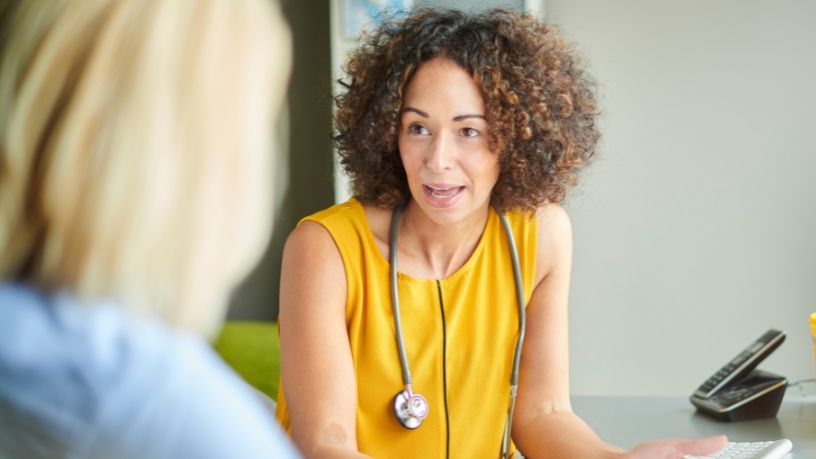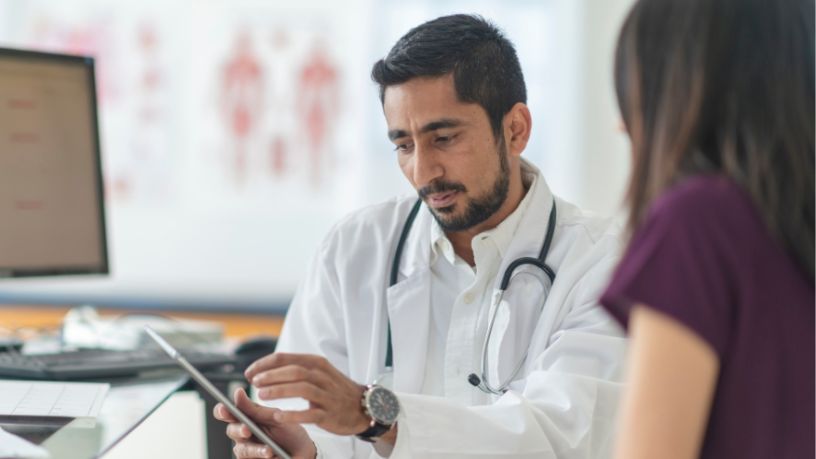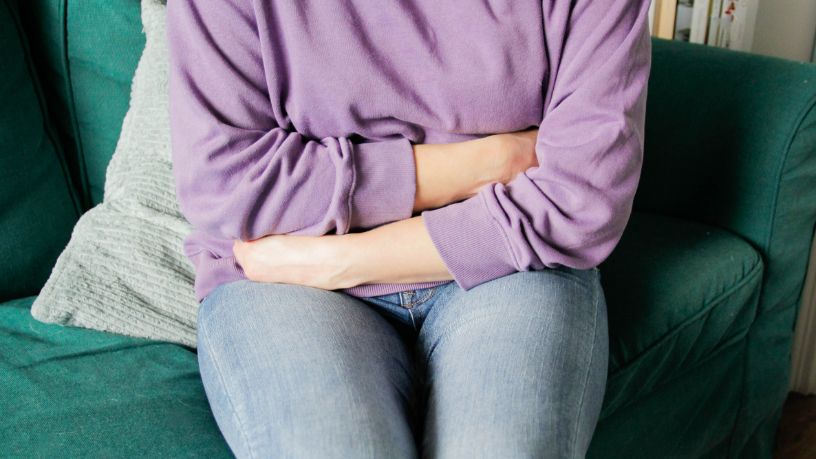A colonoscopy is a procedure that uses a narrow camera to look inside your colon (large bowel).
On this page
Key takeaways
It’s performed to investigate symptoms that affect your bowel, and to check for signs of bowel cancer.
Your doctor can also perform a biopsy (remove a sample of tissue) or remove polyps during a colonoscopy, if necessary.
Your doctor may recommend you have a colonoscopy for many reasons. In some cases, it’s to investigate symptoms, such as bleeding or a change in your bowel habits.
You might also be booked in for a colonoscopy if you’ve received a positive result on an at-home bowel screening test (faecal immunochemical test).
In Australia, it’s recommended that people aged between 45 and 74 years old perform a home faecal immunochemical test every 2 years to screen for bowel cancer. Kits are usually sent in the mail as part of the national screening program.1
A colonoscopy may also be performed if you:
- have symptoms of inflammatory bowel disease (such as ulcerative colitis or Crohn’s disease) and to monitor your bowel if you’ve been diagnosed with these conditions
- have previously had a polyp or cancer removed. Also, to monitor your bowel if you have a family history of an inherited polyp syndrome
- need a follow-up to another test, such as a CT scan or virtual colonography
- have a strong family history of bowel cancer. This might mean you have 2 or more first-degree relatives with bowel cancer or one relative under the age of 45 who had it. A first-degree relative is a parent, brother or sister.
Your doctor can also perform a biopsy (remove a sample of tissue) or remove polyps during a colonoscopy, if necessary.
Preparing for a colonoscopy
Your colonoscopy will be done in hospital and you’ll usually be able to go home the same day. Ask a friend or family member to drive you home, as you’ll be given an anaesthetic and won’t be awake for the procedure. This can make you feel drowsy for a while afterwards, so you won’t be able to drive until the day after.
Your doctor will give you detailed instructions about what you need to do to prepare for your colonoscopy.
Medicines
There are certain medicines that you may need to stop taking before you have a colonoscopy. These could include:
- iron tablets
- anti-diarrhoea medicines or any medicines that may cause constipation
- medicines that affect the way your blood clots (for example, warfarin or clopidogrel).
If you take any of these medicines (or any others), let your doctor know before you have your colonoscopy. They can check if you need to stop taking them and for how long.
Clearing your bowel
Your bowel needs to be completely empty for the procedure so that your doctor can see everything clearly. Your doctor will prescribe a strong laxative to take before your colonoscopy. It usually comes as a powder that you mix with water. Let your doctor know if you’re pregnant or breastfeeding, as you may not be able to take the laxative.
The laxative can quickly give you diarrhoea, so make sure you stay close to a toilet after you take it. You might feel some discomfort or bloating in your tummy (abdomen).
The laxative can taste unpleasant. It may help to drink it slowly, and it might taste better if you put the mixture in the fridge before you drink it. Although the laxative can be unpleasant, it’s really important to clear your bowel so your doctor can see your bowel and identify anything abnormal.
Your doctor will give you advice about what you can eat or drink before the procedure. They may ask you to eat only low-fibre foods or to fast beforehand. This can vary, and might depend on whether you have any health conditions such as diabetes. So, follow the instructions your doctor gives you, and ask if you’re not sure about anything. It’s important to keep drinking plenty of clear fluids, like water or black tea or coffee, to make sure you don’t get dehydrated.
If you take the contraceptive pill, laxatives will prevent it being absorbed. Speak to your doctor about the best way to manage this. You may need to use another form of contraception (such as a condom) for a while.
If you have diabetes, or if you’re having another procedure such as a gastroscopy on the same day, the preparation for a colonoscopy may be different for you. Follow the instructions your doctor gives you, and if you’re unsure, just ask.
Going to hospital
Be informed. Read the 'going to hospital guide' before selecting your hospital.
At the hospital
When you arrive at the hospital, you’ll see a nurse or doctor and can ask them any final questions. They’ll give you a hospital gown to wear.
Colonoscopy procedure
A colonoscopy takes around 30 minutes. You’ll be asleep during the procedure, so you won’t feel or remember anything.
Your doctor will carefully insert the colonoscope into the anus and pump air into your bowel to inflate it slightly and give a better view of your bowel. Your doctor will gently guide the colonoscope through your bowel.
The images from the camera at the end of the colonoscope will appear on a monitor.
Your doctor may take a small sample of cells (a biopsy) if needed and might remove any growths (polyps) they find.
After the colonoscopy
After your colonoscopy, you’ll be monitored until the immediate effects of the anaesthetic have passed. After that, you should be fine to go home when you feel ready. Make sure you’ve organised for someone to take you home.
Before you leave, your doctor may talk to you about the colonoscopy and if they removed any polyps or took any biopsies. If you’ve had a biopsy or had polyps removed, they’ll tell you how and when you can expect to receive your results (it’s usually within a week).
Recovering from a colonoscopy
You may feel bloated and have some cramping pain after a colonoscopy. This is caused by the gas used during the procedure, and it usually settles down within a few hours. If you need pain relief, your doctor may suggest over-the-counter medicines, such as paracetamol or ibuprofen. You may also bleed a little from your bottom if you’ve had a biopsy or a polyp removed. This should stop within a couple of days, but contact your doctor if it doesn’t.
Complications of a colonoscopy
Complications can potentially occur during or after any procedure. The main complications of a colonoscopy include:
- breathing problems. You may have a reaction to the anaesthetic, which can affect your breathing or your heart rate. But your healthcare team will monitor you throughout the procedure, and you can have treatment if this does happen
- a tear in your bowel (bowel perforation), caused by the colonoscope. This is rare. If a tear does happen, you’ll probably need an operation to repair it
- bleeding. This is most likely to happen after having biopsies or polyps removed, and usually stops on its own. Sometimes it can become more serious and require a blood transfusion, but this rarely happens.
Contact your doctor if you continue to bleed from your bottom or have severe pain in your tummy that doesn’t get better within a couple of days.
Resources
The National Bowel Cancer Screening Program provides information and resources, including free screening kits to eligible Australians.
Bowel Cancer Australia offers support online or over the phone on 1800 727 336.
This article was originally published on bupa.co.uk and has been amended in line with Australian guidelines.

At Bupa, trust is everything
Our health and wellbeing information is regularly reviewed and maintained by a team of healthcare experts, to ensure its relevancy and accuracy. Everyone's health journey is unique and health outcomes vary from person to person.
This content is not a replacement for personalised and specific medical, healthcare, or other professional advice. If you have concerns about your health, see your doctor or other health professional.
1Bowel Cancer Australia. (2024). Bowel Cancer Screening. Bowel Cancer Australia.
Australian Society of Anaesthetists. (2024). All about anaesthesia. Australian Society of Anaesthetists.
Cancer Research UK. (2019). Colonoscopy. Cancer Research UK.
General Medical Council. (2020). Decision making and consent. General Medical Council.
Molloy, R. G. (2021). Colorectal assessment. In Molloy, R. G. et al. (Eds), Colorectal Surgery 2nd ed, 33-98. Oxford Academic.
Simon, C., Everitt, H., van Dorp, F., Burkes, M., Hussain, N., Nash, E., & Peet, D. (2020). Gastrointestinal medicine. Oxford Handbook of General Practice, 5th ed.
Villano, A. (2023). Polyps of the Colon and Rectum. MSD Manual.
You might also like...
What to expect when you have a colonoscopy
Some people find the idea of getting a colonoscopy a bit intimidating, so we spoke to a gastroenterologist to find out exactly what you should expect.
Gastroscopy (endoscopy)
Gastroscopy is a procedure that allows a doctor to look inside your oesophagus, stomach and part of your small intestine. Find out how it works.
What to expect when you have a gastroscopy
Are you having a gastroscopy? We speak to a gastroenterologist to answer common questions about this quick and simple procedure so you can be prepared.
Inflammatory bowel disease (IBD): The basics
Inflammatory bowel disease (IBD) is a serious chronic illness that can be managed with the right support.





